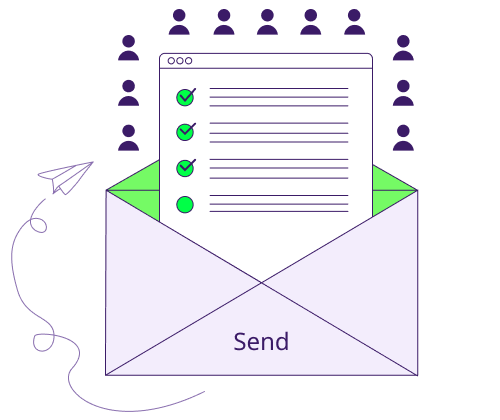Hedera's Email API Benefits
Seamless Integration
Email API services provide well-documented APIs and client libraries that make it easy to integrate email functionality into applications or systems. This streamlines the development process and saves time and effort
Scalability and Reliability
Email API services are designed to handle large volumes of emails efficiently. They offer scalable infrastructure and reliable delivery mechanisms, ensuring that emails reach recipients without delays or issues, even during peak loads.
Time and Cost Savings
Implementing an email API service eliminates the need to build and maintain an in-house email infrastructure. This saves development resources, infrastructure costs, and reduces the complexity of managing email servers with complex codes.
Enhanced Deliverability
Email API services often have dedicated teams and technologies focused on optimizing email deliverability. They work to ensure that emails sent through their services have a higher chance of landing in the recipient's inbox rather than being marked as spam.

Process incoming emails using Inbound email routing
Inbound email routing allows you to automate the handling of incoming emails based on predefined rules or criteria. This streamlines workflow management by automatically categorizing and routing emails to the appropriate departments or individuals.
With inbound email routing, you can set up rules to sort and prioritize incoming emails based on criteria like sender, subject, keywords, or recipient. This ensures that important emails are promptly attended to, reducing response times and improving customer satisfaction.
Inbound email routing systems can handle large volumes of incoming emails efficiently, ensuring that the process remains scalable as your business grows. They also offer flexibility to adapt routing rules and criteria based on evolving business needs.
Use Hedera’s Enterprise Level Features.
Our Email API service simplifies the integration of email functionality into applications, providing developers with the tools they need to send, manage, and track emails programmatically. It enables efficient communication with users, enhances user engagement, and streamlines workflows involving email communications.
Automated Workflow Management
Efficient Email Sorting
Scalability and Flexibility
Personalized Responses
Workflow Integration
Efficient Spam Filtering
Time and Resource Savings
Streamlined Collaboration
Performance Tracking and Reporting
Enhanced Customer Service
Start Sending Mails in Seconds
Built-in Brand Management
Manage UNLIMITED brands and users with access controls at no extra cost, optimized workflows for marketing agencies or consultants
All Email Campaign Types
White Label Options
Frequently Asked Questions
What is an Email API?
An Email API (Application Programming Interface) is a set of protocols and tools that allows developers to integrate email functionality into their applications or services. It enables programmatic access to send, receive, and manage emails without the need for a separate email client.
How does an Email API work?
An Email API works by providing a standardized interface that developers can use to interact with an email server or service. It typically includes methods or endpoints to send emails, retrieve inbox messages, manage folders, handle attachments, and perform other email-related tasks.
What can I do with an Email API?
With an Email API, you can send transactional emails, such as welcome emails, password resets, order confirmations, and notifications, directly from your application. You can also automate email campaigns, manage user inboxes, read incoming messages, search for specific emails, and organize email folders programmatically.
Which programming languages are supported by Email APIs?
Email APIs are usually language-agnostic and can be used with any programming language that supports HTTP requests and JSON or XML parsing. Commonly supported languages include Python, Java, JavaScript, Ruby, PHP, C#, and many others.
Can I use an Email API with my existing email provider?
Yes, many Email APIs are designed to work with popular email providers like Gmail, Outlook.com, Yahoo Mail, and others. They often offer specific integration instructions or SDKs (Software Development Kits) for these providers, making it easier to set up and use the API with your existing email service.
Is it secure to use an Email API?
Email APIs typically provide secure communication channels using encryption protocols such as HTTPS (HTTP Secure). They may also offer authentication mechanisms like API keys or OAuth tokens to ensure authorized access. Additionally, some APIs support advanced security features like DKIM (DomainKeys Identified Mail) and SPF (Sender Policy Framework) to enhance email deliverability and prevent spoofing.
Are there any usage limits or pricing associated with Email APIs?
Usage limits and pricing can vary depending on the Email API provider. Some providers offer free tiers with limited usage, while others have paid plans based on factors like the number of emails sent, API requests made, or features utilized. It’s important to review the documentation or pricing details provided by the API provider to understand their specific terms.
Can I track email delivery and engagement using an Email API?
Yes, many Email APIs provide features to track email delivery and engagement metrics. These features typically include options to monitor email open rates, click-through rates, bounce rates, unsubscribes, and other relevant statistics. By leveraging these metrics, you can gain insights into the effectiveness of your email campaigns.





